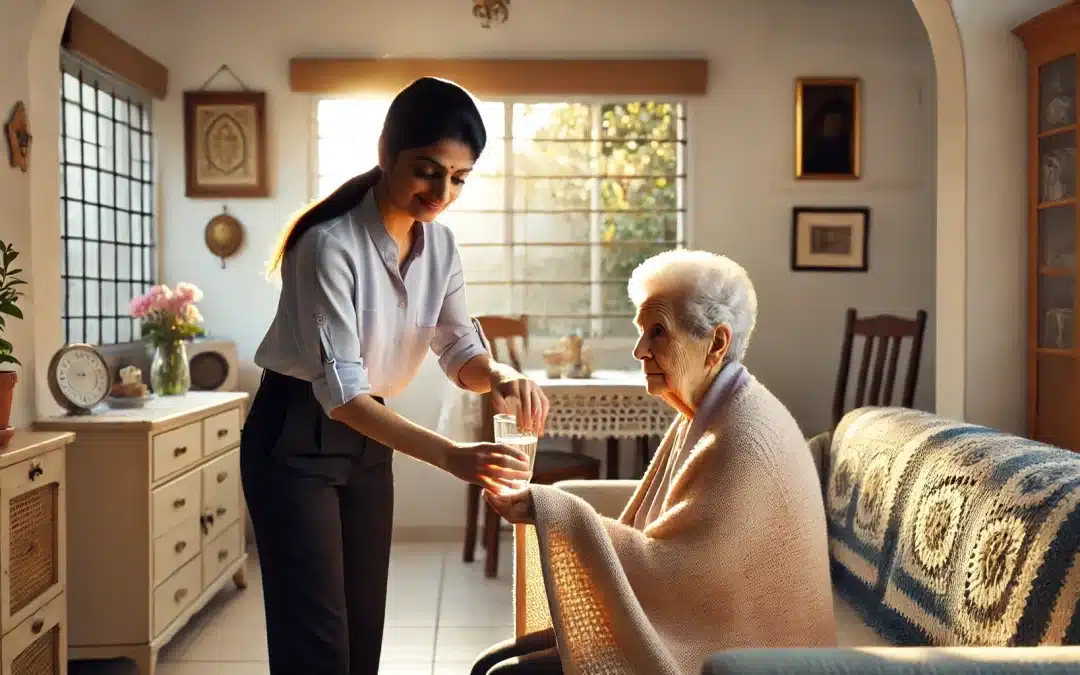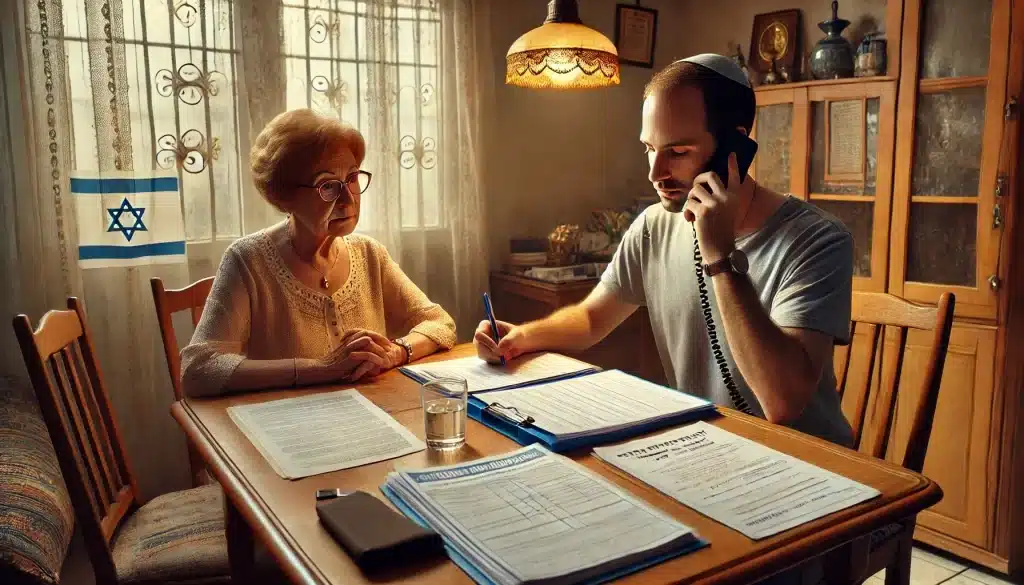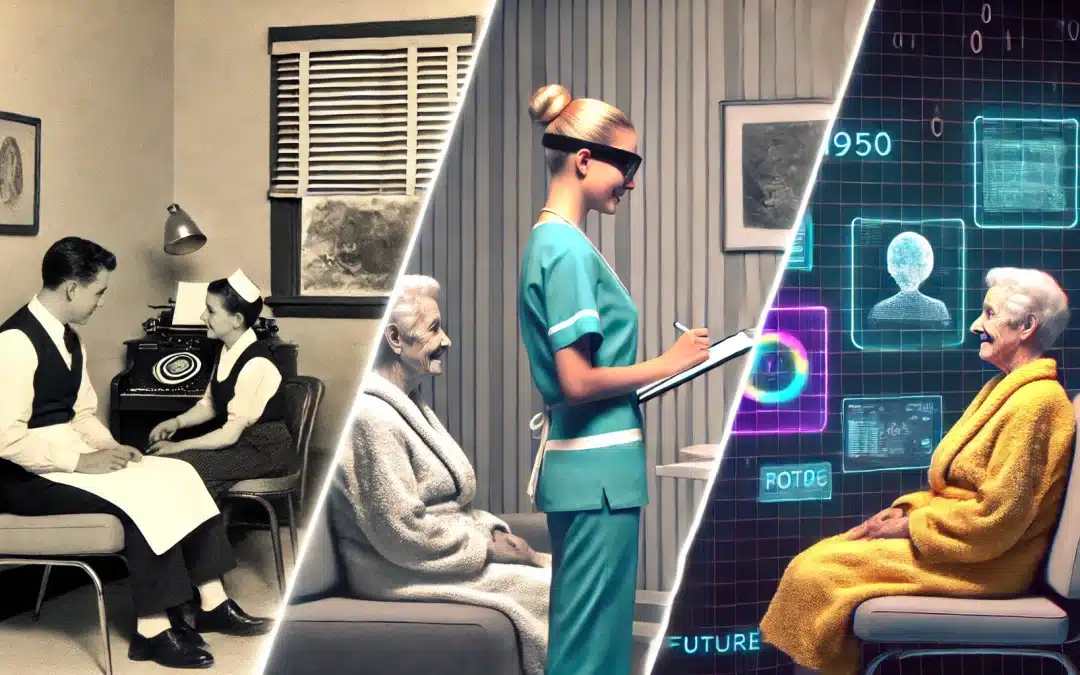
ינו 20, 2025
Having and managing a live-in caregiver for your elderly loved one is a significant life change that requires careful consideration and clear understanding of responsibilities. This guide, the final part in our three-part series on foreign caregivers in Israel, focuses on the essential aspects of maintaining a successful caregiving relationship after you've made your choice (Part 1) and completed the hiring process (Part 2).
To help you navigate this journey successfully, we've created a comprehensive Family Checklist for Managing a Foreign Caregiver that you can download, print, and use to track all necessary tasks – from initial setup through ongoing management (end of article). This checklist, combined with the detailed guidance in this article, will help ensure you don't miss any crucial steps in managing your caregiving arrangement.
In this guide, we'll walk you through everything you need to know about managing a foreign caregiver in Israel, from pre-arrival preparations to handling day-to-day situations and resolving potential conflicts. Whether you're just starting this journey or looking to improve an existing caregiving arrangement, this guide provides the essential information and practical advice you need for long-term success.
Pre-Arrival Preparations: Setting the Foundation of Managing a Live-In Caregiver
Understanding Manpower Agencies (תאגידי כוח אדם)
According to Israeli law, every foreign caregiver must be registered with a licensed manpower agency. This requirement ensures proper oversight and protection for both the caregiver and the employing family.
Major licensed agencies in Israel include:
- A.B. Israeli Center for Caregivers (link)
- Ne’eman Foreign Workers for Nursing (link)
- M.S.D (Link)
A full list can be found in the following link
These agencies serve as the official mediator between the Population and Immigration Authority, the caregiver, and the employing family. Their services include:
- Assignment of a dedicated social worker who conducts mandatory periodic visits (1-2 times annually)
- Processing and renewal of work visas
- Handling required documentation with government authorities
- Providing guidance on legal rights and obligations
- Offering mediation services for conflict resolution
- Monitoring the caregiving situation to ensure compliance with regulations
Annual agency fees typically range from 2,000 to 2,500 NIS, which are paid by the employing family.
Medical Insurance and Healthcare Setup for Managing a Live-In Caregiver
Medical insurance is mandatory for foreign caregivers. According to Israeli law, the caregiver is legally responsible for paying this cost, which typically ranges from 120-180 NIS monthly. However, many families choose to cover this expense to ensure continuous and proper healthcare coverage, even though they are not legally obligated to do so.
Major providers include:
- Harel Insurance (through Shirbit)
- Menora Mivtachim
- Phoenix
Important Healthcare Tips:
- Register the caregiver with the same healthcare provider (קופת חולים), branch (סניף), and primary physician (רופא) as the senior
- This alignment significantly streamlines medical appointments and prescription management
- Ensures better coordination of care between the caregiver and healthcare providers
Basic insurance coverage includes:
- Emergency medical care
- Hospitalization
- Prescription medications
- Basic dental care
Communication Systems Setup
Effective communication requires proper infrastructure:
- Mobile Communication:
- Caregiver needs an Israeli phone number
- Cost responsibility lies with the caregiver
- Recommended providers: Golan Telecom, 019 Mobile, Partner
- Family Communication Framework:
- Create a dedicated WhatsApp group including: Primary family contacts, The caregiver, Healthcare providers when relevant
- Set clear communication guidelines
- Establish emergency contact protocols
Real-World Example: The Cohen family created a WhatsApp group named "Grandpa David Care" including their father's caregiver and three adult children. They established rules for urgent messages (using the 🚨 emoji) versus routine updates, making communication efficient and clear for all parties involved. The group helps coordinate daily care activities, share updates about medical appointments, and ensure everyone stays informed about Grandpa David's well-being.

Preparing Your Home and First Days Together
Creating a Welcoming Environment for Managing a Live-In Caregiver
The initial home setup is crucial for establishing a positive long-term caregiving relationship. Remember, your caregiver will be living in your loved one's home 24/7, making their personal space essential for both comfort and work efficiency. A well-prepared, clean home with dedicated private space for the caregiver demonstrates respect and consideration, setting the foundation for a harmonious relationship.
Home Setup Requirements
Private Room Requirements:
- Clean, well-ventilated room with a window
- Bed and clean bedding
- Closet or wardrobe for personal belongings
- Small desk or table (recommended)
- Access to bathroom facilities
- Fan or air conditioning (especially important during summer)
- Basic lighting and electrical outlets
- Lock for privacy (if possible)
Shared Spaces Setup:
- Clear space in refrigerator for personal food items
- Kitchen storage space for personal belongings
- Access to laundry facilities
- House keys
- Written emergency contact list in clear view
- Basic household orientation guide
First Days Together – Building Relationships and Understanding
The initial days are critical not just for technical orientation but for building trust and understanding between all parties involved. This period sets the tone for the entire caregiving relationship. Take time to:
- Allow the caregiver and senior to get acquainted gradually
- Share family stories and photos to help the caregiver understand your loved one better
- Discuss preferences, habits, and daily routines
- Address any special care requirements openly
Special Care Considerations:
- For seniors with dementia:
- Explain specific behaviors and triggers
- Share successful communication techniques
- Provide detailed safety protocols
- Discuss wandering prevention strategies
- For seniors with physical limitations:
- Demonstrate proper transfer techniques
- Explain pain management routines
- Share exercise or therapy schedules
- Review mobility aid usage
Outside Orientation
Familiarize your caregiver with:
- Local grocery stores and supermarkets
- Nearest pharmacy
- Public transportation stops
- Senior clubs and community centers where seniors gather for activities
- Local parks or meeting places where both seniors and caregivers socialize
- Medical facilities (קופת חולים) location
- Nearby synagogue or place of worship (if relevant)
- Post office and other essential services
Real-World Example: "When Ana arrived, we spent the first morning walking around the neighborhood. We showed her the local Supersol where we usually shop, introduced her to the pharmacist at Super-Pharm who handles mom's prescriptions, and showed her the local park where both seniors and caregivers often meet to chat and socialize. This orientation helped her feel more connected to the community and gave mom an opportunity to maintain her social connections."

Managing Day-to-Day Care
Navigating the Initial Transition Period of Managing a Live-In Caregiver
The introduction of a live-in caregiver into a senior's home marks a significant life change for everyone involved. For seniors receiving care for the first time, this transition can be particularly challenging as they grapple with feelings of lost independence and privacy concerns. Even those who have had previous caregivers may struggle, often comparing new caregivers to past ones or having preset expectations that may not align with reality.
Common Initial Challenges:
- Seniors feeling threatened by loss of independence
- Privacy adjustments and sharing living space
- Building trust between caregiver and senior
- Family members learning their new roles
- Establishing new daily routines
To ease this transition, maintain open dialogue and respect the senior's need for control over certain aspects of their daily life. Remember that trust and comfort develop gradually – rushing this process rarely leads to positive outcomes.
Medical Care and Medication Management
One of the most critical aspects of senior care is proper medication management. While caregivers play a vital role in day-to-day care, the primary responsibility for medication management should typically rest with a designated family member.
Key Responsibilities: Family Member:
- Managing prescription schedules and renewals
- Communicating with healthcare providers
- Ensuring adequate medication supply
- Overseeing any changes in medication
Caregiver's Role:
- Following established medication schedule
- Documenting each administration
- Reporting side effects or concerns
- Monitoring daily health changes
Financial Management
Managing finances in a caregiving relationship requires careful consideration and clear boundaries. As a general rule, caregivers should have minimal direct financial interactions with the senior. Instead, a designated family member should oversee all financial aspects of care.
Best Practices for Financial Management:
- Designate one family member as financial manager
- Establish clear purchasing protocols
- Keep detailed records of all expenses
- Maintain a small emergency fund for caregiver use
- Review receipts and expenses regularly
Real-World Example: "In our family, my brother handles the weekly grocery shopping, while I manage medical supplies and prescriptions. Our caregiver has access to a small emergency fund, but every purchase is documented with receipts that we review weekly. This system prevents any confusion or potential conflicts about money."
Break Time and Rest Periods
While Israeli law mandates specific rest periods for caregivers, including a weekly 24-hour break, many caregivers prefer alternative arrangements such as shorter daily breaks. This flexibility can work well, but requires careful planning and monitoring.
Break Time Considerations:
- Assess senior's ability to be alone safely
- Set clear break schedules and duration
- Establish check-in protocols
- Have emergency contacts readily available
- Monitor adherence to agreed schedules
For daily breaks (typically 2 hours), ensure:
- Break timing works with senior's routine
- Senior has emergency contact means
- Clear start and end times are established
- Regular review of arrangement effectiveness
The key to successful break management is finding the right balance between caregiver needs and senior safety. Regular communication about these arrangements helps ensure they continue to work for everyone involved.

Understanding Legal Rights and Challenges of Managing a Live-In Caregiver
Employment Rights and Obligations
Foreign caregivers in Israel are protected by specific labor laws that establish their rights and working conditions. Understanding these regulations is crucial for maintaining a proper and legal employment relationship. While detailed salary calculations can be found in our salary calculation guide, here are the key elements you need to manage:
Basic Rights Overview:
- Monthly salary (as per current regulations)
- Weekly rest period (minimum 24 hours)
- Annual vacation days
- Sick leave
- Holiday allowance
- Pension contributions
- Recuperation pay (דמי הבראה)
Planning for Annual Vacation
Foreign caregivers typically take a one-month vacation annually, usually during summer, to visit their homeland. This extended break combines both paid annual leave and unpaid leave, as the standard annual vacation allowance doesn't cover the entire month. The number of paid vacation days depends on the caregiver's years of service (ותק):
- First year: 14 paid vacation days
- 2-3 years: 16 paid vacation days
- 4-5 years: 18 paid vacation days
- 6+ years: 21 paid vacation days
For example, if a caregiver who has worked for two years takes a month-long vacation (30 days), 16 days would be paid vacation days, while the remaining 14 days would be unpaid leave. This arrangement should be clearly documented in the employment contract and discussed in advance. The vacation requires careful advance planning, particularly regarding visa arrangements and finding a suitable temporary replacement (reliever).
Key Vacation Planning Considerations:
- Begin planning several months in advance
- Arrange return visa documentation
- Secure a reliable reliever caregiver
- Coordinate handover periods
While technically the responsibility for finding a reliever falls to the regular caregiver, in practice, this often becomes the family's responsibility. Finding a suitable reliever can be challenging as they are typically foreign caregivers whose regular work permits have expired, making them highly sought after, especially during popular vacation periods.
Pro Tip: Consider engaging professional assistance, such as HappySeniors or similar care management services, to help secure a reliable reliever. Their expertise and connections can significantly reduce the stress of finding temporary coverage.
Managing Conflicts and Challenges
Caregiving relationships can face various challenges that require careful handling and professional intervention. Three primary sources of conflict often emerge:
- Misaligned Expectations: The gap between family expectations and caregiver duties can create tension. Clear communication about responsibilities, working hours, and care standards is essential from the start.
- Daily Living Conflicts: Living together 24/7 can strain relationships between seniors and caregivers. Seniors may exhibit challenging behaviors, especially those with conditions like dementia that can lead to verbal abuse or even violence. Conversely, caregivers might have strong personalities or different living habits that clash with the senior's preferences.
- Fundamental Compatibility Issues: Sometimes, despite best efforts, there might simply be a poor fit between the caregiver and senior, requiring a change in caregiver.
The Importance of Professional Mediation for Managing a Live-In Caregiver
Many families find it challenging to handle caregiving conflicts effectively. With their own life pressures and limited time, they often hope the caregiving arrangement will be "fire-and-forget." However, this approach can lead to deteriorating situations and increased stress for all parties.
While manpower agencies provide basic oversight, they typically don't offer comprehensive conflict resolution services as part of their standard package. For this reason, engaging a private social worker or case manager can be invaluable. These professionals offer:
- Unbiased mediation
- Extensive experience in conflict resolution
- Regular monitoring of the caregiving relationship
- Professional intervention before situations escalate
- Practical solutions based on experience'
Real-World Example: "We initially tried handling conflicts with our caregiver directly, leading to tense confrontations and stress for everyone involved. After engaging a professional case manager, they helped resolve the issues by understanding both sides' perspectives and implementing practical solutions. Their calm, professional approach transformed what had been a deteriorating situation into a stable, positive caregiving relationship."
Support Resources
Several professional resources are available for managing caregiver relationships:
- Private Case Managers/Social Workers
- Provide ongoing monitoring and support
- Offer professional conflict resolution
- Help maintain stable caregiving relationships
- Kav LaOved (קו לעובד)
- Phone: 03-6883766
- Workers' rights guidance and support
- Ministry of Labor (משרד העבודה)
- Official oversight and regulations
- Labor law compliance guidance
Remember that investing in professional case management services can prevent many common caregiving challenges and provide peace of mind for both families and caregivers.

Keys to Long-term Success for Managing a Live-In Caregiver
Building a Sustainable Care Environment
Creating a successful long-term caregiving relationship requires ongoing attention and proactive management. This final section of our guide focuses on essential practices that help maintain a stable and positive caregiving environment.
Regular Review and Assessment
Schedule periodic evaluations of the caregiving arrangement to ensure it continues meeting everyone's needs. Monthly family meetings can help address concerns before they become problems and maintain clear communication channels between all parties.
Key Review Areas:
- Senior's health status and changing needs
- Caregiver's wellbeing and job satisfaction
- Care plan effectiveness
- Communication effectiveness
- Required adjustments to routines or responsibilities
Professional Support Network for Managing a Live-In Caregiver
Maintaining a strong professional support network is crucial for long-term success. This network should include:
- Primary Care Physician
- Case Manager/Social Worker
- Specialist Healthcare Providers
- Support Groups (for both family and caregiver)
- Emergency Backup Caregivers
- Agency Contacts
Maintaining Healthy Boundaries
Long-term caregiving relationships often become quite personal, making it important to maintain appropriate professional boundaries while still fostering a caring environment.
Best Practices:
- Keep roles and responsibilities clear
- Maintain consistent work schedules
- Respect private time and space
- Address issues promptly and professionally
- Document important decisions and changes
Real-World Example: "After three years with our caregiver, we've learned that regular monthly meetings with our case manager help maintain a balanced relationship. We discuss any concerns openly, adjust care plans as needed, and ensure everyone's needs are being met. This proactive approach has helped us avoid many potential problems."
Signs That Changes May Be Needed
Be alert to signs that the current caregiving arrangement may need adjustment:
Warning Signs:
- Declining care quality
- Increased conflicts or tension
- Changes in senior's health needs
- Caregiver burnout symptoms
- Communication breakdowns
Final Recommendations for Managing a Live-In Caregiver
Based on our experience helping numerous families manage their caregiving relationships, we recommend:
- Stay Proactive: Don't wait for problems to emerge before seeking support or making adjustments.
- Invest in Professional Support: The cost of professional case management is often far less than the expense and stress of frequent caregiver changes or crisis management.
- Maintain Clear Documentation: Keep records of schedules, agreements, and any changes to the care plan.
- Focus on Prevention Regular: check-ins and open communication can prevent many common caregiving challenges.
- Value the Relationship: Remember that a positive caregiving relationship benefits everyone – the senior, the family, and the caregiver.
Conclusion
Managing a live-in caregiver relationship successfully requires dedication, clear communication, and proper support systems. While it may seem overwhelming at first, following the guidelines in this series of articles can help you create and maintain a stable, positive caregiving environment that benefits everyone involved.
Remember that you're not alone in this journey. Professional support is available and can make a significant difference in the success of your caregiving arrangement. For more information about managing foreign caregivers in Israel, contact HappySeniors for professional guidance and support.
Professional Support for Your Managing a Live-In Caregiver Journey
Managing a caregiving relationship is a complex and ongoing process that requires attention, understanding, and often professional guidance. As we've seen throughout this series of articles, various challenges can arise at different stages of the caregiving journey – from initial setup to daily management and conflict resolution.
HappySeniors' professional case management services can help you navigate these challenges effectively. Our experienced social workers provide comprehensive support, ensuring that both your loved one and their caregiver maintain a positive and productive relationship. We understand that each family's situation is unique, and we tailor our support accordingly.
Our case management services include:
- Regular monitoring and assessment of the caregiving relationship
- Professional mediation and conflict resolution when needed
- Guidance with administrative and bureaucratic requirements
- Assistance in finding suitable replacement caregivers during vacations
- Ongoing support for both families and caregivers
We invite you to contact us for professional guidance and support:
Remember that investing in professional case management can prevent many common caregiving challenges and provide peace of mind for everyone involved in the caregiving relationship.
Family Checklist for Managing a Live-In Caregiver
Initial Setup (Before Caregiver Arrival)

דצמ 22, 2024
Have you already decided that Finding a live-in caregiver is the right choice for your loved one? Whether you're continuing your journey from our previous guide on deciding to hire a caregiver or just starting your research, you're in the right place.
New to the caregiving journey? We strongly recommend starting with our previous guide first. It will help you understand if Finding a live-in caregiver is the right choice for your situation and walk you through the important initial decisions.
Already read our first guide? Welcome back! Now that you've made the decision to hire a caregiver, this guide will walk you through the crucial next steps – finding, interviewing, and Finding the right person for your loved one.
Introduction
Finding the right caregiver for your loved one is one of the most crucial decisions you'll make in their care journey. This guide focuses specifically on the recruitment process – how to find, interview, and hire a foreign live-in caregiver in Israel. We'll explore the entire process, from initial search to final hiring, ensuring you have all the information needed to make informed decisions at each step.
Why This Guide Matters?
The relationship between a caregiver, the senior, and their family is complex and multifaceted. Foreign caregivers take on this challenging work primarily as an economic opportunity, earning significantly more than they could in their home countries. The reality is that providing 24/7 care is incredibly demanding, especially when caring for seniors with physical disabilities, cognitive impairments, or other health challenges.
Adding to this complexity is the fact that many seniors may not be able to fully articulate their needs or provide accurate feedback about their potential caregiver. This makes the selection process particularly critical – it requires careful consideration not just of skills and experience, but also of personality fit and long-term sustainability of the caregiving relationship.
What This Guide Covers?
In this comprehensive guide, we will:
- Compare hiring an experienced foreign caregiver already in Israel versus bringing a new caregiver from abroad
- Walk through the different methods of finding and screening potential caregivers
- Provide detailed guidance on the interview process
- Explain the finding a live-in caregiver procedures and legal requirements
- Outline the costs and financial assistance options available
Timeframes to Consider
When planning to hire a caregiver, it's important to understand the typical timeframes:
- Hiring an experienced caregiver already in Israel: Usually takes 2 – 4 weeks, depending on the caregiver's availability and current employment situation
- Bringing a new caregiver from abroad: Typically requires 6 – 12 weeks, including visa processing, travel arrangements, and orientation
A Note on Caregiver Origins
Foreign caregivers in Israel primarily come from several regions: Eastern Europe (particularly former Soviet Union countries), South Asia (primarily India and Nepal), Southeast Asia (predominantly the Philippines) ,Other regions as approved by Israeli immigration authorities. Each region brings its own cultural background, work approach, and typical skill sets to the caregiving relationship.
Let's proceed through each stage of the recruitment process, ensuring you have the knowledge and tools to make the best choice for your family's specific needs.
Understanding Your Finding a Live-in Caregiver Options
When Finding a Live-in caregiver in Israel, you'll typically choose between two main paths: hiring an experienced caregiver who is already working in Israel or bringing a new caregiver from abroad. Each option comes with its own set of advantages and considerations that need to be carefully weighed against your specific situation.
Experienced Caregivers Already in Israel
These are foreign caregivers who have already worked with one or more Israeli families. Here's what you need to consider:
| Advantages |
Important Considerations |
| Familiarity with Israeli culture and healthcare system |
Generally command higher salaries due to experience |
| Experience navigating local medical facilities |
May have specific preferences about work conditions |
| Basic Hebrew language skills |
Often more selective about their placements |
| Can typically start work more quickly |
Might prefer less physically demanding cases |
| Understanding of local customs and expectations |
Could have established work patterns that are harder to modify |
| Established references from Israeli families |
Limited availability as they're usually employed |
| No adaptation period needed |
May have specific requirements about who they work with |
Finding a Live-in Caregiver from Abroad
| Advantages |
Important Considerations |
| Larger pool of candidates to choose from |
Longer process (6-12 weeks) for visa and arrival |
| More flexibility in matching to your needs |
Need time to adjust to Israeli culture and systems |
| Often more adaptable to your family's routines |
May require more guidance and support initially |
| Generally more accepting of various work conditions |
Language barriers might be more pronounced |
| Available for immediate long-term commitment |
Training levels can vary significantly |
| More competitive initial salary expectations |
Need time to learn the local healthcare system |
| Fresh energy and motivation for the role |
Cultural adaptation period required |
Bridging the Waiting Period
If you decide to bring a new caregiver from abroad, the waiting period (6-12 weeks) can be challenging. One common solution is to arrange for a temporary reliever caregiver who can provide care during this transition period. This option will be discussed in detail in the following sections of this guide.
Making Your Choice Finding a Live-in Caregiver
The decision between these options often depends on several key factors:
- Urgency of Need
- Immediate need might favor experienced caregivers
- Planned future need allows time for bringing someone from abroad
- Level of Support You Can Provide
- New caregivers need more initial guidance
- Experienced caregivers require less orientation
- Care Requirements
- Complex medical needs might benefit from experienced care
- Basic care needs might work well with either option
- Long-term Plans
- Consider the potential length of employment
- Think about future care needs and adaptability
Remember that regardless of which option you choose, the success of the caregiving relationship depends largely on proper matching, clear communication of expectations, and ongoing support for both the caregiver and your loved one.
Finding a Caregiver: Methods and Processes
The process of finding a foreign caregiver in Israel varies significantly depending on whether you're looking for someone who is already in Israel or bringing a new caregiver from abroad. Each path has its own unique requirements, challenges, and considerations.
Finding a Live-in Caregiver Caregiver Already in Israel
When searching for a caregiver who is already in Israel, you have two main options: conducting a private search or working with professional agencies. Let's examine both approaches in detail.
Private Search Process
While private searching gives you direct control over the process, it comes with significant challenges and time investments. Here's what you need to know:
Online Platforms and Communities:
- Specialized Job Boards: Platforms specifically designed for caregiving positions in Israel: iSavta: A dedicated platform connecting families with caregivers, Helpbook: is a leading Israeli platform that connects families with caregivers for various needs, including senior and disabled care.
- Social Media Networks: Facebook Groups, WhatsApp Communities, Telegram Channels.
A private search can be overwhelming, challenging, and time-consuming for several reasons:
- You'll need to screen numerous candidates, many of whom may not match your requirements
- Verifying credentials and work history requires significant effort and expertise
- Understanding labor laws and requirements can be complex
- Without experience, it's difficult to evaluate caregiver competencies effectively
- The process can take weeks or months of active searching
- You may encounter language barriers during the screening process
- There's a risk of missing important red flags that experienced professionals would catch
Professional Agency Assistance
Working with professional agencies like HappySeniors offers a comprehensive, guided approach that goes far beyond simple caregiver placement:
- Professional Assessment: A dedicated social worker case manager who:
- Conducts a thorough evaluation of your loved one's needs
- Considers family dynamics and preferences
- Assesses the living environment and care requirements
- Helps define the ideal caregiver profile for your situation
- Comprehensive Matching Process:
- Access to a pre-screened database of qualified caregivers
- Background verification and reference checks
- Skills and experience validation
- Personality matching with your loved one
- Cultural compatibility assessment
- Administrative Support:
- Assistance with Bituach Leumi (National Insurance) applications
- Help securing available funding and benefits
- Guidance through all required paperwork
- Coordination with relevant authorities
- Ongoing Support:
- Regular monitoring of the caregiving situation
- Conflict resolution when issues arise
- Guidance for both family and caregiver
- Assistance with any necessary adjustments
- Support throughout the entire caregiving period
Bringing a Caregiver from Abroad
When bringing a caregiver from abroad, working with licensed agencies is not just recommended – it's required. Here's what you need to understand:
Agency Requirements
- Only licensed agencies can legally facilitate bringing foreign caregivers to Israel
- The process must comply with Israeli immigration and labor laws
- Agencies handle visa applications and necessary documentation
- Pre-arrival screening and preparation is conducted in the caregiver's home country
Process Timeline and Steps
- Initial Consultation and Assessment
- Meeting with agency representatives
- Evaluation of care needs
- Documentation of requirements
- Financial arrangements discussion
- Candidate Selection
- Review of potential candidates
- Video interviews with shortlisted caregivers
- Background checks and credential verification
- Final selection and agreement
- Immigration Process
- Visa application and processing
- Travel arrangements
- Arrival coordination
- Initial orientation and setup
The Importance of Professional Guidance
Whether choosing a caregiver already in Israel or bringing someone from abroad, professional guidance offers significant advantages:
- Time and Stress Reduction: Professionals handle the complex processes while you focus on your loved one
- Risk Mitigation: Expert screening reduces the likelihood of unsuitable matches
- Comprehensive Support: Assistance extends beyond initial placement to ongoing care management
- Legal Compliance: Ensures all arrangements meet Israeli legal requirements
- Problem Resolution: Professional support for handling any issues that arise
- Resource Access: Connection to additional services and support systems as needed
The choice between finding a caregiver already in Israel or bringing someone from abroad depends on various factors, including urgency of need, specific care requirements, and long-term plans. Professional agencies like HappySeniors can help you evaluate these factors and choose the most appropriate path for your situation.
Finding a Live-in Caregiver: The Interview Process – Finding a Right Match
The interview process is perhaps the most crucial step in finding the right caregiver for your loved one. This is your opportunity to evaluate not just professional qualifications, but also the personal qualities that will make the caregiving relationship successful. Whether you're interviewing an experienced caregiver already in Israel or speaking with a potential caregiver from abroad, a structured and thorough approach is essential.

Before the Interview: Essential Preparation
Successful interviews don't happen by chance – they require careful preparation. Before you begin interviewing candidates, take time to document your specific needs and expectations. This preparation phase is crucial for both private interviews and agency-guided processes. First, create a detailed care requirements document that includes not just physical care needs, but also psychological and emotional considerations:
- Daily care tasks and responsibilities
- Medical procedures or treatments needed
- Physical assistance requirements
- Dietary needs and food preparation expectations
- Schedule and time-off arrangements
- House rules and living arrangements
- Psychological and emotional needs, including:
- Senior's personality traits and preferences
- Communication style and emotional triggers
- Social interaction preferences
- Daily routines and habits
- Anxiety or stress factors
- Cognitive state and mental health /considerations
- Family dynamics and relationships
This document serves two purposes: it helps you stay focused during the interview and ensures you communicate clear expectations to potential caregivers.
Setting Up the Interview
The interview setting matters significantly, whether it's in person or virtual. For local caregivers, try to conduct the interview in the home where they will be working. This gives candidates a clear picture of the environment and allows you to observe their reactions and comfort level.
For caregivers abroad, video interviews are essential. Here's how to make them effective:
- Schedule at a time that works for both time zones
- Test your video connection beforehand
- Have a backup communication method ready
- Ensure good lighting and clear audio
- Have a translator available if needed
Core Interview Topics
The interview should cover several key areas that will determine the success of the caregiving relationship:
1. Professional Experience and Capabilities
Begin with a thorough discussion of the caregiver's professional background. Ask about:
"Tell me about your experience caring for elderly patients. What types of conditions have you managed?"
Look for detailed responses that demonstrate:
- Understanding of medical conditions
- Familiarity with relevant medical equipment
- Experience with similar care situations
- Problem-solving abilities in medical emergencies
- Knowledge of proper care protocols
2. Personal Approach to Caregiving
Understanding how a caregiver approaches their work is crucial. Explore this through questions like:
"Can you describe a challenging situation with a previous patient and how you handled it?"
Listen for responses that show:
- Patience and empathy
- Problem-solving skills
- Emotional intelligence
- Ability to maintain professional boundaries
- Respect for the elderly
3. Cultural Compatibility and Communication
Cultural fit and communication abilities are essential for a harmonious household. Discuss:
- Language abilities in relevant languages
- Understanding of local customs
- Dietary knowledge and restrictions
- Religious observance if relevant
- Comfort with local cultural norms
Red Flags and Warning Signs
During the interview, stay alert for potential warning signs that might indicate future problems:
Concerning Responses – Watch for:
- Vague or evasive answers about past experience
- Reluctance to provide references
- Inconsistent information about work history
- Unclear explanations about gaps in employment
- Dismissive attitudes toward previous employers
Behavioral Red Flags – Watch for:
- Poor punctuality for the interview
- Inappropriate dress or presentation
- Constant interruptions or checking phone
- Reluctance to discuss certain topics
- Overly focused on money or time off
The Agency-Guided Interview Difference
Working with professional agencies like HappySeniors transforms the interview process into a structured, professionally guided experience that significantly increases your chances of finding the right match. Professional agencies bring years of experience in matching caregivers with families, understanding both the obvious and subtle factors that contribute to successful caregiving relationships.
The agency-guided process begins with comprehensive pre-screening. Before you meet any candidate, the agency conducts thorough background checks, verifies documentation, and assesses both professional skills and personal qualities. This preliminary screening saves you time and ensures you only meet qualified candidates who match your basic requirements.
During the interview phase, agency professionals serve as expert facilitators. They guide the conversation to cover all crucial areas, help bridge language gaps, and provide valuable cultural context that might affect the caregiving relationship. Their presence allows you to focus on assessing personal compatibility while they ensure all professional qualifications are properly evaluated.
Perhaps most importantly, agencies provide crucial post-interview analysis. They help you:
- Evaluate candidates objectively against your requirements
- Compare different candidates' strengths and weaknesses
- Identify potential issues that might not be immediately apparent
- Assess long-term compatibility factors
- Make informed decisions based on both professional criteria and personal fit
This professional guidance is particularly valuable when interviewing multiple candidates, as it helps maintain consistent evaluation standards and provides an objective perspective to complement your personal impressions.
Multiple Interview Approach in Finding a Live-in Caregiver
Finding the right caregiver is a process that shouldn't be rushed or simplified. Multiple interviews with several candidates are essential for making an informed decision. This comprehensive approach should include:
Initial Screening Interviews
- Interview multiple candidates to create a shortlist
- Assess basic qualifications and compatibility
- Compare different approaches and personalities
Follow-up Interviews
- Conduct deeper discussions with promising candidates
- Include other family members for additional perspectives
- Observe how candidates respond to different family dynamics
Senior Meeting and Observation
- Arrange meetings between candidates and your loved one
- Observe interactions and chemistry
- Notice how candidates respond to specific care situations
- Assess communication styles and patience levels
Take detailed notes after each interview and meeting. Pay attention to how different family members respond to each candidate and how comfortable your loved one feels with them.
Making Your Final Decision Finding a Live-in Caregiver
Selecting a caregiver is one of the most important decisions you'll make for your loved one's care. This decision requires careful consideration of multiple factors and shouldn't be rushed. Take time to gather input from all family members involved and carefully weigh the pros and cons of each candidate. The interview process is crucial in finding the right caregiver for your loved one. Take the time to conduct multiple interviews, involve all relevant family members, and carefully evaluate each candidate. Remember that the next phase of the process – handling finding a live-in caregiver procedures and legal requirements – is equally important and should be approached with the same level of attention to detail
Remember that the interview process is just the beginning of the caregiving relationship. Taking time to conduct thorough interviews and carefully evaluate candidates will help ensure a successful long-term care arrangement for your loved one.
Finding a Live-in Caregiver Procedures and Legal Requirements
After selecting a suitable caregiver, you'll need to navigate the employment and registration process. Understanding your options and their implications is crucial for making an informed decision that best serves both your loved one's needs and your financial considerations.
Employment Options and Their Implications
Direct Employment (העסקה ישירה)
Direct employment can offer significant cost savings – up to 30% compared to agency employment – but requires more administrative responsibility on your part. Under this arrangement:
- You are the direct employer of the caregiver
- You handle salary payments and benefits directly
- You manage work schedules and time off
- You maintain all required documentation
- You must still register with a licensed manpower agency (תאגיד) for supervision
The cost savings come primarily from: Elimination of agency management fees, Direct handling of salary payments. More flexible arrangement of work hours, Direct negotiation of terms within legal requirements.
Agency Employment (through חברת סיעוד)
Working through a nursing care agency provides comprehensive management but at a higher cost. The agency:
- Takes full responsibility as the employer
- Handles all salary calculations and payments
- Manages vacation days and substitutes
- Ensures compliance with all labor laws
- Provides ongoing support and problem resolution
- Handles emergency situations and replacements
- Offers professional guidance and supervision
Combined Employment Model
An important option often overlooked is the ability to split the employment between: Agency management for hours covered by Bituach Leumi and direct employment for additional care hours
This hybrid model can help:
- Optimize costs while maintaining professional support
- Ensure proper management of government benefits
- Provide flexibility in care arrangements
- Balance administrative burden with cost savings
The Role of Manpower Agencies (תאגיד) in Finding a Live-in Caregiver
All foreign caregivers must be registered with a licensed manpower agency, regardless of employment method. These agencies provide crucial oversight and support:
- Regular monitoring of employment conditions
- Social worker visits and assessments
- Documentation verification and maintenance
- Mediation in conflicts or problems
- Ensuring compliance with labor laws
- Visa status monitoring
Social Worker Visits: The agency must provide periodic visits by a social worker who: Evaluates the caregiving situation, Assesses the senior's wellbeing ,Reviews living and working conditions ,Provides professional recommendations, Documents any concerns or needs, Ensures quality of care standards
Initial Costs and Registration Process in Finding a Live-in Caregiver
Registration Fees
- Manpower Agency Registration: Approximately 2,800 NIS
- Additional administrative fees may apply
- Visa processing fees where applicable
Required Documentation
For Employers:
- ID (תעודת זהות) and copies
- Proof of residence
- Bank account details
- Power of attorney (if applicable)
- Medical documentation for care recipient
For Caregivers:
- Valid passport
- B/1 work visa
- Professional certification
- Medical examination results
- Israeli bank account for salary transfers
- Previous employment records
Additional Considerations
While this guide covers the main aspects of finding a live-in caregiver procedures, there are several other important areas you'll need to understand as you move forward with employing a caregiver. Monthly salary calculations and benefits can be complex, varying based on hours worked and specific arrangements. Bituach Leumi eligibility and benefits play a crucial role in determining your care coverage and financial support options. Additionally, there are numerous legal rights and obligations, along with specific labor laws and requirements that govern the employment of foreign caregivers in Israel. For comprehensive information about these topics, we recommend referring to our dedicated articles or reaching out to HappySeniors for professional guidance tailored to your specific situation.
Throughout this process, professional agencies like HappySeniors can provide invaluable assistance, helping you navigate the complexities of caregiver employment while ensuring compliance with all legal requirements. Their expertise can help you avoid common pitfalls and create a smooth transition into the caregiving relationship.
How “Happy Seniors” Can Assist You Finding a Live-in Caregiver
Navigating the complexities of finding a live-in caregiver from abroad can be challenging for families and seniors alike. At Happy Seniors, we are dedicated to easing this burden by providing comprehensive support and professional case management. Our experienced social workers are here to guide you through every step, helping you secure the best funding and care options available.
Our Services Include:
- Personalized Case Management: Tailored assistance to meet your family’s unique needs.
- Funding Assistance: Guidance in obtaining government funding for elderly care.
- Emotional Support: Providing compassionate support to families during this transition.
- Care Setting Consultation: Helping you find the most suitable care environment for your loved one.
Contact Us:
At Happy Seniors, our mission is to ensure that your loved ones receive the highest quality care in the most appropriate environment, along with the financial assistance they deserve. Let us help you navigate this journey with confidence and peace of mind.

דצמ 3, 2024
Hiring a live-in caregiver from abroad ("foreign caregiver") is a significant decision that can profoundly impact your family's life. For families in Israel, this process involves unique cultural, legal, and logistical considerations. Our guide is specifically tailored to assist Israeli families considering hiring a live-in caregiver for their loved ones.
This guide is the first in a three-part series designed to assist you through each stage of this journey of hiring a Live-in caregiver:
- Initial Decision and Preparation: Understanding the need and preparing for Hiring a Live-in Caregiver.
- Recruitment Process: Finding, interviewing, and hiring the right caregiver.
- Maintenance and Support: Ensuring a successful long-term caregiving relationship.
Our aim is to provide practical advice while addressing the emotional and logistical challenges you may face during the initial decision-making process.
Key Insight: A successful caregiving arrangement isn't just about finding someone to provide physical assistance—it's about creating a supportive environment that enhances your loved one's quality of life while providing peace of mind for the entire family.
Having the Conversation
Understanding Your Loved One's Perspective
Approaching the topic of introducing a live-in caregiver into your loved one's home can be delicate and challenging. It's essential to recognize the emotions and concerns they may have about this significant change. Understanding their perspective allows you to address their fears compassionately and thoughtfully.
Key concerns your loved one may have in Hiring a Live-in Caregiver include:
- Expectations that family members will provide care: They may have always believed that their spouse or children would be the ones to support them, making the idea of outside help seem unnecessary or even like a personal rejection.
- Fears of losing independence and privacy: Inviting someone new into their personal space can feel intrusive, leading to anxiety about losing control over their daily routines and personal decisions.
- Concerns about communication barriers with a non-local caregiver: Worries about language differences and cultural misunderstandings might make them hesitant, fearing they won't be able to express their needs effectively.
- Cultural expectations regarding family care responsibilities: Cultural or societal norms may emphasize that family members should provide care, making external assistance seem inappropriate or stigmatized.
- Cognitive decline making change particularly frightening: For seniors experiencing cognitive issues or dementia, any change can be confusing and frightening, intensifying resistance to new arrangements.
By acknowledging these concerns, you demonstrate respect for their feelings and create an opportunity for open dialogue.
Key Insight: Understanding your loved one's fears and expectations is crucial in approaching the conversation about care. Empathy and patience lay the foundation for a supportive discussion that can lead to a mutually agreeable solution.
With this understanding, you can now employ effective communication strategies to address their concerns thoughtfully. In the next section, we'll explore practical approaches to facilitate this important conversation.
Effective Communication Strategies
Approaching the conversation with empathy and clarity can make a significant difference in how your loved one receives the idea of a live-in caregiver. Here are specific strategies to facilitate a constructive dialogue:
- Express Your Limitations Compassionately Ans Stress Your Inability to Provide 24/7 Care: Gently explain that due to work commitments, caring for your own children, or other responsibilities, you are unable to be present around the clock.
- Example Script: "Dad, I wish I could be here with you all the time, but with my job and the kids needing my attention, I can't provide the constant care you deserve."
- Reassure Your Continued Support Promise That You Are Not Leaving Them: Emphasize that Hiring a Live-in Caregiver doesn't mean you're abandoning them. Assure them that you will continue to visit regularly and remain actively involved in their life.
- Example Script: "Having someone here to help doesn't change how much I love you. I'll still come by every day after work to spend time together."
- Choose the Right Moment and Setting Find a calm, comfortable environment free from distractions to have the conversation. This could be during a quiet afternoon at home or while enjoying a favorite activity together.
- Express Empathy and Concern: Begin by expressing your love and desire for their well-being.
- Example Script: "Mom, your happiness and health are so important to me. I want to make sure you have all the support you need."
- Highlight the Benefits: Emphasize how a caregiver can enhance their quality of life by assisting with daily tasks, providing companionship, and allowing them to continue enjoying their hobbies and routines.
- Example Script: "With some extra help around the house, you can spend more time doing the things you love without worrying about the harder tasks."
- Involve Them in the Decision-Making Process: Encourage their participation in selecting the caregiver to ensure they feel included and respected.
- Example Script: "Let's look at some caregiver profiles together and see who might be a good fit for you."
- Share Personal Stories and Positive Examples: Relate experiences of friends or relatives who have had positive outcomes with live-in caregivers.
- Example: "Remember Aunt Leah? She was hesitant at first, but now she and her caregiver have become close friends."
- Offer a Trial Period: Suggest starting with a short-term arrangement to see how it works, reducing the pressure of a long-term commitment.
- Example Script: "What if we try having someone help out for a few weeks and see how you feel about it?"
- Address Communication and Cultural Concerns: Reassure them that many caregivers are eager to learn Hebrew and that you can help bridge any language or cultural gaps together.
- Example Script: "We can find someone who is learning Hebrew, and we'll all work together to make communication easy."
- Acknowledge Their Fears and Listen Actively: Allow them to express their concerns without interruption. Validate their feelings by acknowledging their fears and showing understanding.
- Example Script: "I understand that this is a big change, and it's okay to feel unsure. Let's talk about what's worrying you."
Key Insights:
- It's a Process, Not a One-Time Conversation: Recognize that accepting the need for a live-in caregiver is a significant change for your loved one. They may need time to process the idea, so be prepared for multiple discussions over days or even weeks. Patience is essential as they adjust to the new reality.
- Let the Idea "Cook": Introduce the concept gently and allow your loved one time to reflect on it. Rushing the decision may lead to resistance. By giving them space, you're showing respect for their autonomy and helping them come to terms with the change at their own pace.
By employing these strategies and understanding that this conversation may unfold over time, you can create a supportive environment where your loved one feels heard, respected, and involved in the decision-making process. This thoughtful approach paves the way for a smoother transition to having a live-in caregiver.
Understanding Your Care Options
Now that you've begun the conversation with your loved one and are giving them time to adjust to the idea of additional support, it's important to explore all the care options available. Understanding these options will help you make an informed decision that best suits your loved one's needs and preferences, as well as the family's capabilities.
Key Decision Point: While several care options exist, hiring a live-in caregiver from abroad can offer a comprehensive solution for seniors requiring round-the-clock care while maintaining their home environment. By evaluating all available options, you can determine whether this choice aligns with your loved one's needs and your family's circumstances.
Overview of Care Options
- Family Caregiving
- Israeli Part-Time Caregivers
- Nursing Homes
- Live-in Caregiver from Abroad
Let's delve into each option to understand their advantages and challenges.
1. Family Caregiving
Advantages:
- Emotional Comfort: Care is provided by loved ones who have a deep understanding of the senior's preferences and habits.
- No Language or Cultural Barriers: Communication is seamless, and cultural practices are shared.
- Cost Savings: Financial expenses are minimized compared to Hiring a Live-in Caregiver professional.
Challenges:
- Physical and Emotional Burnout: Family members may experience stress and fatigue, affecting their health and relationships.
- Impact on Personal Lives: Balancing caregiving with work, raising children, and other responsibilities can be overwhelming.
- Lack of Professional Training: Family members may not have the necessary skills to handle medical or specialized care needs.
- Unsustainable Long-Term: Providing 24/7 care can become impractical over time.
2. Israeli Part-Time Caregivers
Advantages:
- Professional Assistance: Caregivers are trained and experienced in providing elder care.
- Cultural Familiarity: Shared language and cultural practices ease communication and understanding.
- Flexible Hours: Care can be scheduled according to specific needs.
Challenges:
- High Cost: Hourly rates can accumulate quickly, making it an expensive option for extensive care.
- Limited Availability: Scheduling conflicts may arise, leading to coverage gaps.
- Multiple Caregivers: May require coordinating with more than one caregiver to cover all needed hours, leading to inconsistency.
3. Nursing Homes
Advantages:
- Comprehensive Care: Access to 24/7 medical supervision and assistance.
- Structured Environment: Provides routines and activities designed for seniors.
- Social Interaction: Opportunities to engage with other residents.
Challenges:
- Loss of Familiar Environment: Moving away from home can be distressing.
- Less Personalized Attention: Staff may have limited time for one-on-one interaction.
- High Cost: Often the most expensive option.
- Emotional Impact: Feelings of abandonment or isolation may occur.
4.Hiring a Live-in Caregiver from Abroad
Advantages:
- Aging in Place: Allows your loved one to stay in the comfort of their own home.
- Consistent Care: One caregiver provides continuous support, fostering a strong relationship.
- Cost-Effective for 24/7 Care: More affordable than round-the-clock hourly care.
- Personalized Assistance: Care can be tailored to the senior's specific needs and routines.
- Cultural Enrichment: Opportunity for mutual cultural exchange and learning.
Challenges:
- Language and Cultural Adaptation: Initial communication barriers may exist, requiring patience and effort from both parties.
- Living Space Requirements: Accommodations must be made in the home for the caregiver.
- Employment Management: Legal responsibilities as an employer, including contracts and adherence to labor laws.
- Adjustment Period: Time needed for both the caregiver and senior to adapt to each other.
Care Options Comparison Table
| Care Option |
Best For |
Cost Level |
Level of Care |
Impact on Senior's Life |
Family Involvement Required |
| Family Caregiving |
Short-term or partial care needs |
Low financial cost, high personal cost |
Variable, limited by availability |
Minimal disruption to routine |
Very High – significant commitment |
| Israeli Part-Time Caregivers |
Independent seniors needing specific-time assistance |
High hourly cost |
Professional but time-limited |
Moderate adjustment needed |
Moderate – scheduling and oversight |
| Nursing Home |
Complex medical needs requiring constant supervision |
Highest |
Comprehensive medical care |
Complete lifestyle change |
Low – mainly administrative |
| Hiring Live-in Caregiver from Abroad |
Long-term comprehensive care at home |
Moderate-High, cost-effective for 24/7 care |
Comprehensive personal care |
Maintains home environment with adaptation |
Moderate – management and support |
Key Insight: Each care option has its unique benefits and challenges. It's essential to weigh these factors against your loved one's needs, preferences, and the family's capacity to provide support. Openly discussing these options with your loved one can help them feel involved and respected in the decision-making process.
Transitioning to the Preferred Option
After reviewing all options, you might find that hiring a live-in caregiver from abroad offers the best balance of comprehensive care and maintaining your loved one's quality of life. Involving your loved one in this evaluation reinforces their autonomy and can ease the transition.
In the next section, we'll explore how to find the right caregiver, ensuring a successful match that meets both your loved one's needs and the caregiver's abilities.
Finding the Right Caregiver
Selecting the right caregiver is not just a step in the process—it's the cornerstone upon which the entire caregiving experience is built. This decision will significantly impact your loved one's quality of life, your family's peace of mind, and the overall success of the care arrangement. The caregiver you choose will become an integral part of your loved one's daily routine, providing not only physical assistance but also emotional support and companionship. Therefore, finding the right match is absolutely crucial.
A well-matched caregiver can enhance your loved one's well-being, foster a positive relationship, and ensure a smooth integration into your family life. Conversely, a poor match can lead to discomfort, stress, and the disruption of care, necessitating the arduous process of finding a replacement. The stakes are high, and careful consideration is essential.
Exploring Caregiver Source Options
When searching for a live-in caregiver, you generally have two primary options:
- Bringing a New Caregiver from Abroad
- Hiring an Experienced Caregiver Already in Israel
Each option has its advantages and challenges. Understanding these can help you make an informed decision that best suits your loved one's needs.
Caregiver Source Options Comparison
| Aspect |
New Caregiver from Abroad |
Experienced Caregiver in Israel |
| Initial Cost |
Higher (visa, travel, agency fees) |
Lower (local transfer fees) |
| Experience Level |
Limited/None in Israeli context |
Proven track record locally |
| Adaptation Period |
Longer (3-6 months) |
Shorter (1-2 months) |
| Flexibility |
Generally more adaptable |
May have set working styles |
| Salary Expectations |
Initially lower |
Generally higher |
| Risk Level |
Higher (unknown performance) |
Lower (verifiable references) |
| Language Skills |
Usually minimal Hebrew |
Basic Hebrew common |
| Cultural Understanding |
Limited |
Established |
Detailed Analysis of Each Option
1. Bringing a New Caregiver from Abroad
Best When:
- Your loved one is still relatively independent and can participate in the adaptation process.
- The family has time to invest in training and helping the caregiver adjust.
- Lower ongoing costs are a priority.
- You desire a caregiver who can grow into the role and potentially stay long-term.
- Flexibility and adaptability are valued over immediate experience.
Considerations:
- Adaptation Period: Expect a longer adjustment phase as the caregiver acclimates to a new country, culture, and your family's routines.
- Training Needs: Additional time and effort will be required to train the caregiver in specific care tasks and household expectations.
- Language Barrier: Communication may be challenging initially; patience and support will be necessary.
- Unknown Performance: Without prior experience in Israel, assessing their capabilities relies on overseas references and interviews.
Advantages:
- Flexibility: New caregivers may be more open to adapting to your loved one's specific needs and preferences.
- Long-Term Potential: They may be more likely to commit to a longer stay, providing continuity of care.
- Cost Savings Over Time: While initial costs are higher, ongoing salary expectations may be lower.
2. Hiring an Experienced Caregiver in Israel
Best When:
- Immediate skilled care is required due to complex medical needs.
- Quick adaptation is necessary, and there's less time available for training.
- Communication in Hebrew is important for your loved one's comfort.
- You prefer a caregiver with a proven track record and verifiable local references.
Considerations:
- Higher Salary Expectations: Experienced caregivers may command higher wages due to their expertise.
- Established Work Habits: They may have set ways of working, which could require negotiation to align with your family's preferences.
- Availability: Finding an available experienced caregiver may be challenging due to demand.
- Shorter Commitment: They may prefer shorter contracts or have other obligations that limit long-term availability.
Advantages:
- Quick Integration: Familiarity with Israeli culture and systems allows for a smoother transition.
- Proven Skills: Their experience provides confidence in their ability to handle care responsibilities effectively.
- Language Proficiency: Better communication can enhance the relationship with your loved one.
Key Insights:
- Assess Your Priorities: Determine what factors are most important—be it immediate experience, cost considerations, long-term commitment, or adaptability.
- Involve Your Loved One: Their comfort and preferences should guide the decision, especially regarding language and personality fit.
- Consider Timing: If you have the luxury of time, bringing a caregiver from abroad might be feasible. If urgent care is needed, an experienced local caregiver may be the better option.
- Weigh Risks and Benefits:Each option carries its own risks and potential rewards. Balancing these against your family's needs will help in making the right choice.
Finding the right caregiver goes beyond choosing between these two options. It's about ensuring compatibility on multiple levels—physical needs, communication, cultural fit, and emotional connection. In the next section, we'll delve into The Matching Process, where we'll explore how to evaluate these factors in depth, conduct effective interviews, and utilize professional support to find the caregiver who is the best fit for your loved one and family.

The Matching Process in Hiring a Live-in Caregiver
Just as selecting the right caregiver is crucial, the matching process itself is where the foundation for a successful caregiving relationship is truly established. This stage isn't merely about ticking boxes on a checklist; it's about finding a caregiver whose skills, personality, and values align seamlessly with your loved one's needs and preferences. A thoughtful and thorough matching process can significantly enhance the quality of care and the overall experience for everyone involved.
Why It Matters: Even the most qualified caregiver may not be the right fit if there's a mismatch in personality, communication style, or cultural understanding. A poor match can lead to discomfort, misunderstandings, and ultimately, a breakdown in the caregiving relationship. This not only affects your loved one's well-being but also results in additional stress and potential financial costs for the family as the search begins anew. Investing time and effort in this process helps prevent future issues, promotes harmony, and contributes to the overall success of the care arrangement.
Key Considerations
When matching a caregiver to your loved one, consider the following areas:
- Physical and Medical Needs
| Factor |
Considerations |
| Health Conditions |
Dementia, Parkinson's, diabetes, dialysis requirements, or other illnesses requiring specialized care |
| Mobility Level |
Ability to walk independently, use of wheelchair or mobility aids, need for transfers between bed and chair |
| Continence Care |
Assistance with toileting, use of diapers, ability to control bladder and bowel movements |
| Daily Activities |
Tasks the senior can perform independently vs. those needing assistance (e.g., bathing, dressing, eating) |
| Left Alone |
Whether the senior can be safely left alone for short periods or requires constant supervision |
| Mental State |
Cognitive abilities, memory issues, mood disorders, need for mental stimulation or companionship |
- Lifestyle and Habits
| Factor |
Considerations |
| Living Situation |
Whether the senior lives alone, with a spouse, family member, or has pets in the home |
| Smoking Habits |
If the senior or caregiver smokes, and if this affects compatibility |
| Dietary Preferences |
Special diets, food restrictions, kosher kitchen requirements |
| Sleep Patterns |
Senior's sleep schedule, need for nighttime assistance |
| Hygiene Practices |
Bathing frequency, grooming preferences |
| Religious Observance |
Sabbath observance, holiday practices, need for caregiver to respect or participate |
- Communication and Cultural Compatibility
| Factor |
Considerations |
| Language Skills |
Need for Hebrew, English, or other language proficiency |
| Cultural Sensitivity |
Understanding and respecting cultural norms and practices |
| Communication Style |
Preferences for formal or informal interaction, patience, clarity |
- Family Expectations and Caregiver Understanding
| Factor |
Considerations |
| Task Expectations |
Clarity on tasks the caregiver is expected to perform (e.g., cooking, cleaning, medical assistance) |
| Caregiver's Experience |
Previous experience with specific conditions (e.g., dementia, Parkinson's) |
| Boundaries |
Defining personal space, privacy, and professional boundaries |
| Flexibility |
Ability to adapt to changing needs or schedules |
Steps in the Matching Process when Hiring a Live-in Caregiver
- Assess Needs Thoroughly
- Document all physical, medical, and emotional needs of the senior.
- Note any specific skills required, such as experience with certain medical equipment or conditions.
- Define Caregiver Criteria
- Create a detailed list of qualifications and personal attributes desired in a caregiver.
- Prioritize essential factors over those that are preferred but not critical.
- Screen and Interview Candidates
- Use reputable agencies to find candidates.
- Prepare questions that address all key considerations.
- Include the senior in interviews when possible.
- Evaluate Compatibility
- Observe interactions between the senior and caregiver.
- Ensure mutual understanding of expectations and responsibilities.
- Discuss lifestyle and habit compatibility.
- Check References and Background
- Verify experience, especially with relevant medical conditions.
- Conduct background checks for safety
Key Insights
- The Process Is More Than a Job Interview: You're not just hiring an employee; you're selecting someone who will be a daily companion and caregiver to your loved one. Trust is paramount, and the caregiver will become an integral part of your family's life. The emotional and physical well-being of your loved one depends on this relationship.
- Invest in the Selection Process: Dedicate substantial time and resources to evaluate candidates thoroughly. Conduct in-depth interviews, observe interactions with your loved one, and perform comprehensive background and reference checks. This investment helps ensure safety, compatibility, and peace of mind.
- Professional Assistance Is Highly Recommended: Engaging a social worker or professional case manager can greatly enhance the matching process. These professionals bring expertise in assessing needs, understanding family dynamics, and evaluating caregiver qualifications. Their guidance can help you navigate complex considerations and make informed decisions.
By carefully considering these factors and utilizing available resources, you increase the likelihood of finding a caregiver who not only meets the practical needs but also fits well with your loved one's personality and lifestyle. This thoughtful approach lays the foundation for a successful and harmonious caregiving relationship.
Cultural Integration and Mutual Respect, hiring a Live-in caregiver
With a well-matched caregiver selected, the next crucial step is integrating them into your loved one's daily life and home environment. This integration goes beyond logistical arrangements; it involves building a relationship founded on cultural understanding and mutual respect. Since the caregiver is from abroad, addressing cultural differences proactively can enhance the caregiving experience for everyone involved.
Importance of Cultural Integration
- Enhances Communication: Understanding each other's cultural backgrounds improves mutual understanding and reduces misinterpretations.
- Builds Trust and Respect: Recognizing and valuing each other's customs fosters a positive and respectful relationship.
- Creates a Harmonious Environment: A culturally sensitive approach promotes comfort and satisfaction for both the caregiver and your loved one.
Strategies for Cultural Integration
- Open Dialogue
- Share Cultural Practices: Encourage both the caregiver and your loved one to share their traditions, holidays, and customs.
- Discuss Expectations: Clearly communicate daily routines, religious observances, and any household norms.
- Example: Have a family meeting to introduce the caregiver to your traditions and invite them to share theirs.
- Language Support
- Language Learning: Provide resources for the caregiver to learn basic Hebrew, and consider learning simple phrases in their native language.
- Use of Translation Tools: Utilize apps or devices to aid communication during the initial adjustment period.
- Respect for Religious Observances
- Explain Religious Practices: Inform the caregiver about any religious customs, such as observing Shabbat or dietary laws like keeping kosher.
- Accommodate Differences: Encourage mutual respect for differing religious beliefs and practices.
- Shared Activities
- Cultural Exchange: Engage in activities that allow for sharing cultures, such as cooking traditional meals together or celebrating festivals.
- Include Them in Appropriate Family Events: Involve the caregiver in family gatherings where appropriate to foster a sense of belonging.
- Set Clear Boundaries
- Define Roles and Responsibilities: Clearly outline the caregiver's duties to prevent misunderstandings.
- Respect Privacy: Discuss personal space and privacy needs to ensure comfort for both parties.
- Provide Support
- Offer Resources: Help the caregiver access community resources, support groups, or cultural organizations.
- Regular Check-ins: Schedule times to discuss how things are going and address any concerns.
Key Insight:
Mutual Respect Enhances Care Quality. By embracing cultural differences and fostering mutual respect, you create a supportive environment where both your loved one and the caregiver feel valued and understood. This positive relationship not only makes daily interactions more pleasant but also contributes to better overall care, as the caregiver is more engaged and your loved one feels more comfortable and secure.
Integrating the caregiver culturally is a vital continuation of the matching process. While finding a caregiver whose skills and personality align with your loved one's needs is essential, ensuring they can coexist harmoniously within your family's cultural context is equally important. This integration fosters trust, reduces potential conflicts, and lays the groundwork for a successful, long-term caregiving relationship.

Resources and Support Hiring a Live-in Caregiver
As you navigate the journey of hiring a live-in caregiver from abroad, it's essential to leverage the resources and support networks available to you. These resources can provide guidance, assist with legal and administrative tasks, and offer emotional support throughout the process.
| Resource |
Description |
Contact Information |
| Population and Immigration Authority |
Handles visas and work permits for foreign caregivers |
Phone: *3450
Website: www.piba.gov.il |
| National Insurance Institute (Bituach Leumi) |
Provides information on benefits, entitlements, and employer obligations |
Phone: *6050
Website: www.btl.gov.il |
| Ministry of Labor, Social Affairs and Social Services |
Offers guidance on elder care programs, legal rights, and employment standards |
Phone: 118
Website:
https://www.gov.il/en/departments/molsa/govil-landing-page |
| Hotline for Workers' Rights |
Provides assistance on employment rights and obligations |
Phone: 1-800-354-354
Website: www.kavlaoved.org.il |
| Licensed Caregiver Placement Agencies |
Professional agencies specializing in matching families with qualified caregivers |
Note: Ensure the agency is licensed by the Ministry of Labor. A list of licensed agencies can be found on the ministry's website or by contacting them directly. |
| Legal Aid Department (Ministry of Justice) |
Offers legal assistance regarding employment contracts and rights |
Phone: 1-700-70-60-44
Website: www.justice.gov.il |
| Elder Support Organizations |
Provide resources, support, and activities for seniors and their families |
Examples:
– Yad Sarah
Phone: *6444
Website: https://yadsarah.org/
– JDC-Eshel
Website: www.eshelnet.org.il |
Conclusion
Embarking on a Transformative Journey: Hiring a live-in caregiver from abroad is a significant undertaking that requires careful consideration, planning, and compassion. Throughout this guide, we've explored the essential steps and considerations to help you make informed decisions tailored to your loved one's needs and your family's circumstances.
Key Steps Recap:
- Open Communication: Engage in honest and empathetic conversations with your loved one, allowing them time to adjust to the idea of additional support.
- Explore Care Options: Evaluate all available care options to determine the best fit for your loved one's needs and preferences.
- Careful Selection: Invest time in the matching process to find a caregiver who aligns with your loved one's physical needs, personality, and lifestyle.
- Cultural Integration: Foster mutual respect and understanding to create a harmonious living environment that benefits both your loved one and the caregiver.
- Utilize Resources: Leverage specific government, professional, and community resources to navigate legal requirements and access support.
Final Key Insight
A Thoughtful Approach Leads to Lasting Benefits: By approaching this journey of Hiring a Live-in Caregiver with diligence, empathy, and open-mindedness, you set the stage for a successful caregiving relationship that can significantly enhance your loved one's quality of life. The effort invested now lays the foundation for peace of mind, comfort, and well-being in the years to come.
Moving Forward Hiring a Live-in Caregiver
This guide is the first in a three-part series designed to support you through every stage of hiring and working with a live-in caregiver from abroad. In the next articles, we will delve deeper into:
- The Recruitment Process: Practical steps for finding, interviewing, and hiring the right caregiver, including legal and ethical considerations.
- Maintenance and Support: Strategies for nurturing a positive long-term relationship with the caregiver, addressing challenges, and ensuring ongoing satisfaction.
Remember: You're not alone in this process. Support is available every step of the way to help you make the best choices for your loved one and your family.
How "Happy Seniors" Can Assist You Hiring a Live-in Caregiver
Navigating the complexities of hiring a live-in caregiver from abroad can be challenging for families and seniors alike. At Happy Seniors, we are dedicated to easing this burden by providing comprehensive support and professional case management. Our experienced social workers are here to guide you through every step, helping you secure the best funding and care options available.
Our Services Include:
- Personalized Case Management: Tailored assistance to meet your family's unique needs.
- Funding Assistance: Guidance in obtaining government funding for elderly care.
- Emotional Support: Providing compassionate support to families during this transition.
- Care Setting Consultation: Helping you find the most suitable care environment for your loved one.
Contact Us:
At Happy Seniors, our mission is to ensure that your loved ones receive the highest quality care in the most appropriate environment, along with the financial assistance they deserve. Let us help you navigate this journey with confidence and peace of mind.

נוב 9, 2024
Sarah sat across from her mother's neurologist at Ichilov Hospital, trying to process what she just heard. Her mother, once a vibrant retired teacher from Haifa, was showing significant signs of cognitive decline. "You should consider applying for guardianship through Beit Mishpat," the doctor suggested gently. Sarah felt overwhelmed – what exactly would this mean under Israeli law, and how would it affect both their lives?
If you find yourself in a similar situation, this guide will help you understand guardianship in Israel, its importance, and the responsibilities it entails. This article builds upon our previous guide about the guardianship application process in Israel.
What is Guardianship in Israel?
Under Israeli law (The Legal Capacity and Guardianship Law 5722-1962), guardianship (אפוטרופסות) is a legal arrangement where the court (Beit Mishpat) appoints a person or corporation to make decisions for another person who is unable to make sound decisions about their health, safety, or property. In Israel, this typically applies to:
- Elderly individuals with cognitive decline
- Adults with disabilities
- Minors in certain circumstances
- Individuals unable to manage their affairs
Why is Guardianship Important in the Israeli Context?
The Israeli legal system places strong emphasis on protecting vulnerable individuals while preserving their dignity and rights. Guardianship serves several crucial purposes within this framework:
- Legal Protection: Provides legal authority recognized by all Israeli institutions
- Healthcare Access: Enables interaction with Kupot Holim (Israeli HMOs) and hospitals
- Financial Management: Allows handling of National Insurance Institute (Bituach Leumi) benefits and other financial matters
- Property Protection: Ensures proper management of assets under Israeli law
- Social Services: Facilitates access to Israeli social services and benefits
Signs That Indicate the Need for a Guardianship in Israel
Consider David's case: his daughter Marina noticed he was repeatedly forgetting to pay his Arnona (municipal tax), leaving food burning on the stove, and making unusual withdrawals from his bank account. These are common signs that might indicate the need for guardianship. Key indicators include:
Medical/Personal Care Signs:
- Inability to communicate effectively with medical staff at Kupat Holim
- Consistent neglect of personal hygiene
- Failure to take necessary medications
- Inability to maintain a safe living environment
Financial/Property Signs:
- Making poor financial decisions
- Becoming victim to scams (unfortunately common among Israeli seniors)
- Inability to manage basic bill payments (Arnona, utilities, etc.)
- Significant changes in spending patterns

Types of Guardianship in Israel
Under Israeli law, there are two main types of guardianship:
1. Guardian of the Person (אפוטרופוס לגוף)
Responsibilities include:
- Making healthcare decisions within the Israeli healthcare system
- Ensuring proper living arrangements
- Coordinating with Kupot Holim and hospitals
- Making decisions about social activities and lifestyle choices
- Working with Israeli social services when needed
2. Guardian of Property (אפוטרופוס לרכוש)
Responsibilities include:
- Managing bank accounts and investments in Israel
- Paying bills and taxes (including Arnona, income tax, etc.)
- Maintaining property and insurance
- Managing pension and Bituach Leumi benefits
- Filing required reports with the Israeli Administrator General (האפוטרופוס הכללי)
Implementing Guardianship Responsibilities in Israel
For Guardian of the Person:
- Create a Care Plan
- Coordinate with Israeli healthcare providers
- Arrange necessary medical care through Kupat Holim
- Establish daily care routines
- Plan for future care needs within the Israeli healthcare system
- Coordinate Care Services
- Work with Israeli healthcare providers
- Arrange for in-home care (metaplot) if needed
- Schedule regular medical check-ups
- Monitor medication management
- Maintain Documentation
- Keep medical records from Israeli healthcare providers
- Document important decisions
- Maintain communication records with healthcare providers
- Keep copies of all legal documents
For Guardian of Property:
- Initial Assessment
- Create inventory of assets as required by the Administrator General
- Review existing bills and obligations
- Identify sources of income (including Bituach Leumi benefits)
- Evaluate insurance coverage
- Financial Management
- Set up guardian accounts at Israeli banks
- Create a budget considering Israeli living costs
- Pay regular bills
- Manage investments according to Israeli regulations
- Maintain detailed financial records as required by law
- Regular Reporting
- Submit annual reports to the Administrator General
- Document major financial decisions
- Keep receipts and statements
- Monitor for any suspicious activity
Best Practices for Guardians in Israel
- Understanding Legal Requirements
- Familiarize yourself with guardianship in Israel laws
- Maintain compliance with Administrator General requirements
- Stay updated on legal changes affecting guardianship
- Communication
- Keep family members informed
- Maintain contact with social workers and care providers
- Document all significant decisions
- Build relationships with relevant Israeli authorities
- Seeking Professional Help
- Consult with Israeli legal experts when needed
- Work with social workers from the Ministry of Welfare
- Join guardian support groups
- Attend training sessions when available
Important Legal Considerations in Israel
- Recent amendments to Israeli guardianship laws emphasize the ward's autonomy
- Guardians must consider less restrictive alternatives when possible
- Regular reporting to the Administrator General is mandatory
- Significant decisions may require special court approval
- Guardians must maintain separate accounts for ward's funds
Remember Sarah from our opening story? She successfully navigated the Israeli guardianship system and now effectively manages her mother's healthcare through Maccabi Healthcare Services while maintaining careful records for the Administrator General.
How We Can Help
Navigating the complex process of appointing a guardian can be challenging for families and the elderly. "Happy Seniors" is here to ease the burden by providing comprehensive support and case management with the help of an experienced social worker, to assist you in obtaining the best funding and care options.
Contact Us:
At "Happy Seniors," our mission is to support families by managing the process of obtaining government funding for elderly care. We also provide emotional support to families and help them find the most suitable setting for their loved ones. Our goal is to ensure that your loved ones receive the highest quality care in the most appropriate environment, along with the financial assistance they deserve.

אוק 28, 2024
Today’s world is aging fast, and with it, the need is growing for social workers who help vulnerable people. Technology, especially Artificial Intelligence (AI)—which is when computers are taught to do tasks we think of as requiring human intelligence—holds promise in supporting social work. Imagine AI tools helping social workers handle big workloads, managing case details efficiently without losing the personal touch. In this article, we’ll take a journey from the early days of social work to today’s challenges and explore how AI could shape its future for the better.
Why Use AI in Social Work?
Social work is a critical profession that aims to improve lives, yet the need is often much greater than the number of available social workers. AI tools could help lighten their load by managing time-consuming tasks, analyzing cases, and even personalizing support. For example, AI-driven assistants could track client histories, flag needs, and help social workers focus on one-on-one interactions rather than being tied up in administrative work.
Imagine a social worker with an AI assistant that can summarize case notes, flag urgent issues, and even connect them to valuable resources. This isn’t a dream or a “what if” scenario—companies, including Happy Seniors, are actively working to bring these technologies to life, turning them into real, practical tools that could transform social work. With this kind of AI support, social workers will be able to give more time and focused care to the people they serve…
A Look Back: The Role of Social Workers
Social work as a profession developed to support individuals and families in times of need. These professionals help vulnerable groups—from children and families to the elderly—improve their quality of life. Over time, social work has become an essential part of communities, though it has often relied on traditional methods. Social workers today are facing a new challenge: as populations age, the need for social support is growing fast, and there aren’t enough social workers to keep up.

Today’s Challenges: An Overwhelmed Profession
Social workers today are in high demand, especially with the growing elderly population. However, the tools available to social workers have often lagged behind, relying on limited technology. This lack of modern technology is partly due to budget constraints and the challenge of adapting social work to systems that automate routine tasks.
A recent study, “Automating Social Assistance,” sheds light on how AI is slowly entering this field. The article examines the use of Robotic Process Automation (RPA)—a type of technology that automates simple, rule-based tasks—in Sweden’s social services. This experiment in automation applied RPA to straightforward tasks, such as entering data and suggesting basic benefit amounts, but it couldn’t handle more complex cases that need human understanding. The RPA system also relied on strict rules, so if a client’s case didn’t fit the template, it required manual intervention.
The experiment showed that while RPA could handle repetitive tasks, it’s not the same as true AI, which can learn, adapt, and make nuanced decisions. Unlike RPA’s rule-based logic, newer AI technologies can interpret context and even predict needs.
Large Language Models (LLMs), such as ChatGPT, are examples of advanced AI that can understand and generate human language, making them well-suited for more complex social work tasks. Intuition Robotics, For instance, they developed ElliQ, a companion robot for seniors that uses Natural Language Processing (NLP)—a type of AI that helps computers understand and respond to human language—and advanced language models (LLMs) to engage in conversations, remember personal details, and respond to mood changes. This level of adaptability is something that rule-based RPA systems alone could never achieve.

The Future: Transforming Social Work with AI and LLMs
With the development of LLMs—advanced AI that can understand and generate human-like responses—the future of social work technology looks promising. Tools like Retrieval-Augmented Generation (RAG), which combines AI’s conversational abilities with up-to-date, personalized information retrieval, could give social workers real-time insights. Imagine an AI that not only knows a client’s history but can retrieve new resources or services they might need, all within seconds.
A great example of this forward-thinking approach is MagicNotes, a system being used in the UK that assists social workers by documenting case notes, summarizing client histories, and providing real-time insights. MagicNotes uses AI in social work that learns from past cases and interprets complex situations to offer meaningful, actionable insights. This type of AI doesn’t replace social workers; instead, it acts as an assistant, helping them make quicker, better-informed decisions.
Here at Happy Seniors, we’re taking these advancements a step further with our Nightingale Platform. Nightingale is an AI-powered case management system created for senior care. Using LLMs, Nightingale assists social workers and caregivers by learning each client’s specific needs and adjusting over time. Nightingale can handle everything from coordinating caregiver schedules to helping seniors navigate complex healthcare options. With a user-friendly interface and 24/7 availability, Nightingale is more than just an assistant; it’s a trusted partner for social workers and families alike.

What’s Next?
Integrating AI in social work will require careful planning. Privacy and data security are paramount, and AI models need to avoid any biases in their suggestions. Nightingale’s AI in social work uses privacy-preserving technology to ensure sensitive data remains secure. It also employs ongoing feedback from users to continually improve its suggestions and interactions.
Combining human compassion with AI-driven assistance could reshape social work as we know it. Social workers will still be the heart of the profession, but AI will provide them with the support they need to better serve communities and meet the growing demands of our aging world.
At Happy Seniors, we’re committed to this future. With Nightingale, we aim to equip social workers and caregivers with AI-driven tools that support the compassionate, personalized care that is essential to improving lives.
How We Can Help You: Compassionate Support During Challenging Times
At Happy Seniors, we know that crises like the current situation in Israel bring unique emotional and physical challenges for seniors. Our services are designed to provide reliable support, helping seniors and their families cope with these difficult times:
Emotional Support
We offer regular check-ins and compassionate conversations to ease feelings of anxiety and loneliness, ensuring that seniors feel cared for and connected.
Physical Assistance
Our trained social workers can visit seniors in person, providing hands-on help and a comforting presence.
Customized Care Plans
Every senior has unique needs. From assistance with daily tasks to companionship, we tailor our services to fit individual circumstances, ensuring comfort and support.
If you or a loved one needs assistance, we’re here to help.
Contact Us:
By staying informed and accessing the support you need, seniors and their families can navigate these trying times with greater security and peace of mind. Remember, help is just a phone call away—you are not alone.
















